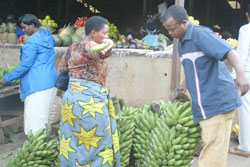The Secretary General of the East African Community (EAC), Dr Richard Sezibera, has appealed to member states to execute policies that were adopted to handle incidences of hunger and food shortages within the bloc.In a statement on the current drought and food insecurity in the region, Sezibera noted that despite the region’s huge potential to produce enough food for regional consumption and surplus for export, the bloc is still affected by food shortages and hunger.


The Secretary General of the East African Community (EAC), Dr Richard Sezibera, has appealed to member states to execute policies that were adopted to handle incidences of hunger and food shortages within the bloc.
In a statement on the current drought and food insecurity in the region, Sezibera noted that despite the region’s huge potential to produce enough food for regional consumption and surplus for export, the bloc is still affected by food shortages and hunger.
He called for the implementation of the EAC Food Security Action Plan and EAC Climate Change Policy to effectively deal with food crisis within the region.
The two policies were adopted by the Summit of Heads of State as a move to deal with the major factors of food insecurity in the bloc.
The factors include inadequate mechanisms to facilitate trade in food commodities between countries with abundant harvest and those experiencing deficits and over dependence on rain-fed agriculture which is highly vulnerable to the unfavourable impacts of climate change.
An EAC Climate Change Fund was established as a financial facility to mobilise adequate, reliable and predictable financial resources to respond to the impacts of climate change, including climatic disasters.
"These (policies) were undertaken in accordance with the EAC Common Market Protocol that provides for free movement of goods and services, including food commodities and conservation of environment,” Sezibera stated.
The provisions of the Common Market Protocol also call for the removal of technical barriers to trade, such as the Non-Tariff Barriers (NTBs).
To coordinate responses to the food crisis and drought emergencies, EAC also developed tools such as a draft Regional Emergency Plan for Pastoralists in arid and semi arid areas.
EAC is also implementing a draft Regional Plan of Action on Animal Diseases Control to curb livestock disease outbreaks, especially trans-boundary diseases such as the Rift Valley Fever that are closely related to climatic variability within the dry lands.
Other tools include dissemination of seasonal rainfall forecasts through Regional Climate Outlook Forums (RCOF), promoting Disaster Risk Reduction (DRR) as a proactive approach to disaster risk management and climate change.
To respond to the current situation and prepare for the future, Sezibera called for the elimination of NTBs to facilitate movement of food, saying that a mechanism for monitoring and eliminating NTBs is in place.
He further appealed for humanitarian assistance from all local and international stakeholders to respond to the current crisis.
Sectoral Councils responsible for Agriculture and Food Security, and Environment and Natural Resources are scheduled to meet this month and comprehensively address all matters related to drought and food insecurity in the region.
Ends


